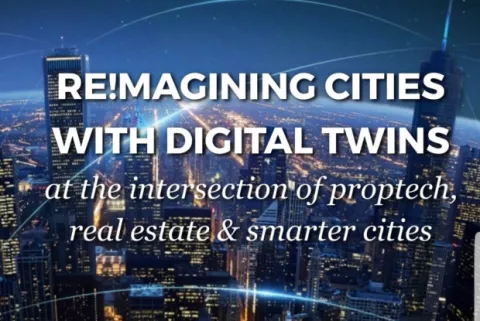
Author: Chungha Cha
Re-!magining Cities, a Seoul, Korea -based NGO and Council partner, recently published a research report on implementing digital twin technology. The report highlights benefits for both property developers and cities.
What is a Digital Twin? We think that there is no shared definition of what a Digital Twin is yet; especially in the case of applying digital twin technology to smart cities. IES is a company active in digital twins and they refer to their ICL Digital Twins as a “unique combination of AI, machine learning and physics based simulation to make real-time performance optimization of built environment assets become a reality.” A few more variations of the definition exist. But, borrowing from the words of one of our smart city mentors, we wish to add that “digital twins are cloud based platforms to drive economic growth based on technology and big data insights.”
For a downloadable pdf file of the full publication, please visit our website:
https://www.re-cities.org/copy-of-smart-cities
Digital Twin for the built environment.
Re!magining Digital Twins is an attempt to explain two things: (1) that digital twins have benefits for real estate developers and cities so there is an opportunity to collaborate for “public-private partnerships” and (2) that there may be strong benefits of a "phased approach" to digital twin deployment. Our publication includes several case studies from proptech companies to demonstrate how solutions in three key areas can be quickly and easily deployed.
1. Energy optimization
2. Health & well being
3. Space optimization
Re!magining Cities is quite active in the proptech space to better understand how the real estate community is adopting technology to improve the performance of their assets. We want to combine these with some of the desires and objectives of Smart Cities so that they can also be actively engaged in the deployment of Digital Twins in their local jurisdictions.
DT Phase 1. Monitoring is the key emphasis for phase one. We could easily tap into the data available in BiMS solutions already installed in many buildings to link the monitoring to saving energy, driving down GHG emissions, enhancing health, saving money and better use of existing space with 15 min real time updates on these metrics. The reserach includes ase studies that demonstrate the business case of phase one and provide insights to the metrics and data insights that become possible.
DT Phase 2. Ability to do the cool stuff like modify physical systems virtually and remotely with the support of machine learning and artificial intelligence. This is where the "business case" can become a bit more difficult. However, we are hoping with Digital Twin Phase One up and running, and data insights get deeper, DT phase 2 and 3 and so on ... the business cases become much clearer to a wider range of stakeholders.



